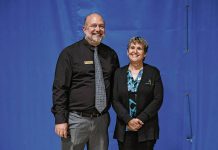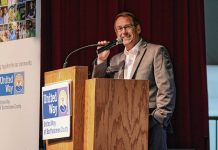A wide-ranging presentation on the Islamic State group and differences between radical and normative Islam opened eyes among about 150 listeners at First Baptist Church.
“Somehow, my heart had been misguided about the Muslim community (before now),” said Columbus Sharon Green, a First Baptist member, at the end of a Sunday talk by David Carlson, Franklin College professor of theology and religion. “I have a new understanding today.”
Green is a native of Perrysburg, Ohio, where a large mosque serves as home to more than 500 Islamic families near Toledo. It is also a place where 1,500 Christians once encircled the mosque in prayer to protect it from backlash after it elected a female leader several years ago.
The local, weekend audience included people from at least four houses of worship besides First Baptist, which is considering sponsoring a Syrian Muslim refugee family, probably in the Indianapolis area, according to a committee at the church.
Carlson spoke on “What Every American Needs to Know About ISIS,” a presentation he has made before at dozens of places such as the Bartholomew County Public Library and before crowds of more than 1,000 in other states. He speaks partly as a professor, partly as a Christian and partly as an author/researcher who has met with Muslim and other faith leaders across the United States the past few years.
Carlson has said that it is vital for Americans, including Christians and other non-Muslims, to understand that the radical Islamic State group wants all normative Muslims to feel as though they never will truly be welcome in the United States and always will be harassed. He also said that normative Muslims love God and tell him the Quran, Islam’s holy book, commands them to pray for Christians, not harm or destroy them.
Columbus’ Isaac Wilkins, a member of the Unitarian Universalist Congregation of Columbus, said that some of what’s happened recently with Muslims and Syrians reminds him of United States residents’ fears about Jewish people coming to America during and after World War II.
“I want to be a part of protecting people,” said Wilkins, who is half Jewish. “We can’t tolerate hatred of Islamic people.”
He spent Christmas in Berlin with his father and a diverse group that included Syrian Muslims.
“They’re just like anyone else,” Wilkins said.
Carlson said that idea has been reinforced with him in many ways, including through a Christian-Muslim group he meets with at an Indianapolis deli owned by a Jewish family.
Crowd member Curtis Burton told the audience that he recently had a discussion with acquaintances who told him that the Quran was an anti-Christian book, and that Christians “should just leave Muslims (and Muslim refugees) where they are.”
He also said his acquaintances say that some Muslims in Dearborn, Michigan, follow Sharia Law more than city, state and U.S. guidelines.
Burton and at least one other questioner asked the professor if there is a way to reach such fearful people with a different, peaceful, unifying perspective.
Carlson said that most people will not change their mind about followers of normative Islam until they meet some of them in person.
“And the issue of Sharia Law is a fear-oriented piece being thrown out regularly by people (to scare others),” Carlson said.
Local Muslims who spoke at a recent panel discussion about their faith said any Muslim ignoring local and national laws cannot be considered a Muslim in good standing and is violating the faith’s core beliefs.
Others wanted to know if Muslim extremists target any one personality type in its recruiting of Americans.
Carlson pointed out that most of the extremist Muslim propaganda is aimed at 18- to 29-year-olds — especially those frustrated either by the unfulfilling American promise of a middle class life with plentiful possessions, or those frustrated by America’s sometimes fragile job market — or both of those elements.
“When was the last time American youth in this country had a major chance to really change something?” Carlson asked. “Probably as far back as the civil rights movement?”
Carlson said some unsatisfied young people who have left the United States for Turkey and other parts to work “for a regular paycheck” for the Islamic State group “were teaching (Christian) Sunday school the whole time they were going through the recruitment process.”
[sc:pullout-title pullout-title=”About David Carlson” ][sc:pullout-text-begin]
David Carlson is a professor of theology and religion at Franklin College.
He has an upcoming book, “Countering ISIL: The Power of Spiritual Friendships.”
Carlson is a frequent speaker and interview subject on the topic of religious violence and, more recently, the rise of the Islamic State. Titles of his talks include “What Every American Needs to Know about ISIL/ISIS,” and “We Dare Not Look Away: ISIL/ISIS’s Appeal to the World’s Youth.”
He also is founder of Shoulder to Shoulder in Interfaith Witness, a movement begun in 2012 that is committed to grieving and witnessing publicly whenever religion is abused for violent purposes.
[sc:pullout-text-end][sc:pullout-title pullout-title=”What is the Islamic State?” ][sc:pullout-text-begin]
Some use the acronym ISIS or ISIL for the Sunni militant Islamic fundamentalist group in Syria and Iraq. It claims religious, political and military authority over all Muslims worldwide.
The Islamic State has sought to demonstrate an expansive reach by its operatives and supporters, claiming to have carried out or inspired in recent months and weeks the bombing of a Russian airliner, attacks in Beirut and Paris and the deadly shooting in San Bernardino, California.
–Associated Press
[sc:pullout-text-end]




